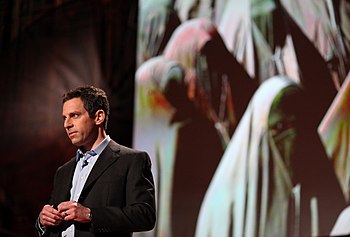| Sam Harris speaking in 2010 (Photo credit: Wikipedia) |
If a co-worker tells me that taking vitamin B-12 supplements has helped her asthma, I ask for additional information which will help me evaluate her claim. Where did she hear about this? If her asthma has improved, how does she know it is the B-12 and not another factor? If I'm truly interested in evaluating the claim, I may search Medline to see whether this "treatment" has been subjected to medical research.
Assume that she fails to provide any reasonable evidence and I discover that the use of B-12 supplements for asthma has not received any support in the scientific literature. I would not hesitate to point this out, and my attitude toward my co-worker would probably change if she were to stubbornly continue making this claim after having been informed of the problems with it.
What makes religion so different? There is no evidence supporting the most basic theistic claims (e.g., that gods exist, that the Christian concept of god is even coherent, etc.). There are compelling arguments against the existence of the sort of god described by Christians (e.g., the problem of evil, scientific evidence disproving many biblical claims, etc.). So why don't we question, criticize, or challenge religious beliefs in conversation? Does it make any more sense to say that I should respect the religious claims than to say that I should respect the B-12 claim?
Ah, but there is a difference, you say. My co-worker is much less likely to have a strong emotional attachment to her B-12 claim than her religious claims. So we avoid this type of discourse because we believe it is likely to be upsetting and we would prefer to avoid this level of conflict. Right? But she could have a very strong emotional attachment to many irrational claims (e.g., appropriate methods of child discipline, effective methods of birth control, etc.), and this would probably not deter our criticism, would it? So what is the difference?

